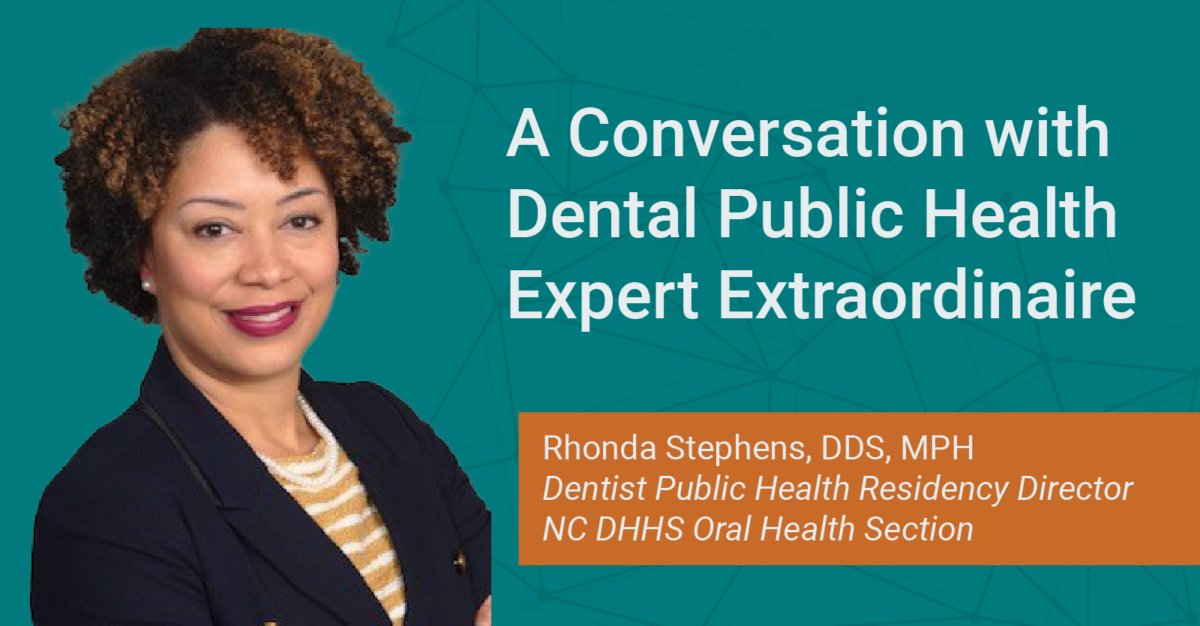Dr. Rhonda Stephens, the North Carolina Department of Health and Human Services, Division of Public Health Oral Health Section’s Dental Public Health Residency Director, recently became the newest Dental Public Health Diplomate in North Carolina. A dedicated public health specialist, Dr. Stephens is well-known in the world of North Carolina dental public health for her dedication to improving the oral health status of all North Carolinians.
We sat down with Dr. Stephens to discuss her role in the Oral Health Section, access to care, and what it means to be a Dental Public Health Diplomate.
What do you do in your current position in the Department of Health and Human Services Oral Health Section?
This may be a long answer because my role has shifted quite a bit. I started off with the general title of a Public Health Dentist Supervisor, but I had many responsibilities under that: supervising some of our public health dental hygienists in the field, supervising our four program managers who are responsible for developing the programs that we implement in the field, and managing our grants.
In the last year or so I have shifted to doing all of that, except no longer supervising field staff, and I took on additional roles and responsibilities with our Dental Public Health Residency training program. I am now the Residency Director and will continue managing grants, in addition to temporarily still supervising our program managers.
Why did you choose a career in public health?
That’s a story that I tell quite often. I practiced in Federally Qualified Health Centers for 11 years as a dental director. That’s a safety-net setting, right, and we’re typically seeing the most vulnerable of the most vulnerable. It felt like a revolving door of the same issues day in and day out, and that I was only making an impact one person at a time, if that.
I think by about 2012 I felt like there had to be a better way — a way to impact change on a broader scale. So, I went back for my Master’s in Public Health while I worked part-time clinically, and then I knew from there that I wanted to move on to a more administrative role in dentistry.
You recently became an American Board of Dental Public Health Diplomate. What is a diplomate, and why did you pursue this distinction?
Each of the specialties in dentistry — like orthodontics, oral maxillofacial surgery, dental public health — all of these specialties require specialty training, and then there’s the opportunity to become certified as diplomates.
You can get any specialty training and opt not to become certified. For me, being certified was more of a personal professional desire, to get that final stamp or seal of approval. It’s a standardized test just like any standardized test, and it says that you have met the requirements established by the particular specialty board.
In dental public health, you can easily be just as qualified of a dental public health practitioner by having gone through a residency and not getting certified; but I wanted to be at the top of my professional game, having that seal of official approval.
Broadly, outside of my job, there isn’t yet a clear understanding among employers — whether its government employers, institutions, nonprofits — about the significance or the value of having the certification. But I wanted to be at that level so when employers do start to value the certification, I’m already there.
My job as the Dental Public Health Residency Director is the only role within our program that requires the certification. I’m fortunate that we have the residency, otherwise there honestly wouldn’t be a role for me to step into. It would just be an extra certification that I just happen to have.
Could you tell me a bit more about the role that dental public health plays within the broader network of dental professionals?
I’ll admit, many of our colleagues in dentistry don’t understand what it means exactly. Public health is very different than understanding how to provide clinical care to a patient. You’re focused on prevention first and foremost. Prevention at a community or population level.
So, some of the things that a clinician, a dental clinician, might do for a patient one-on-one in a clinical setting, aren’t actually effective at a population level. Going through the specialty training for dental public health helps you to understand that.
It’s a little-known specialty, like I said even within our own dental community. Then, more broadly, the general public really has no idea what dental public health specialists do. But we’re here, behind the scenes, working to help people prevent diseases that warrant them going in for emergency and urgent care.
I don’t know the raw numbers, but North Carolina in general seems to be a Mecca for dental public health specialists. We have quite a few who have played a major role in dental public health in North Carolina and beyond at some point. I think North Carolina is unique in a lot of aspects when it comes to dental public health.
NCOHC is a program of the Foundation for Health Leadership & Innovation. To get involved, find out more information, and to stay up to date, head over to NC4Change to sign up for our newsletter and see what events and other opportunities are on the horizon.


